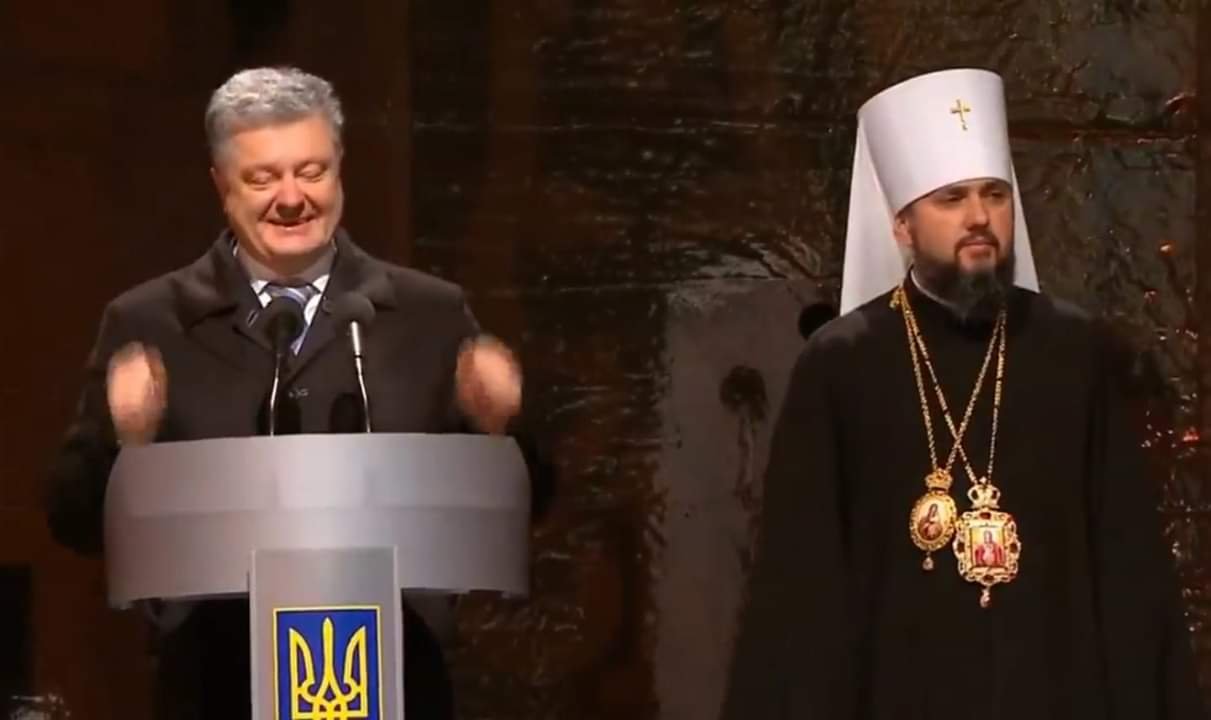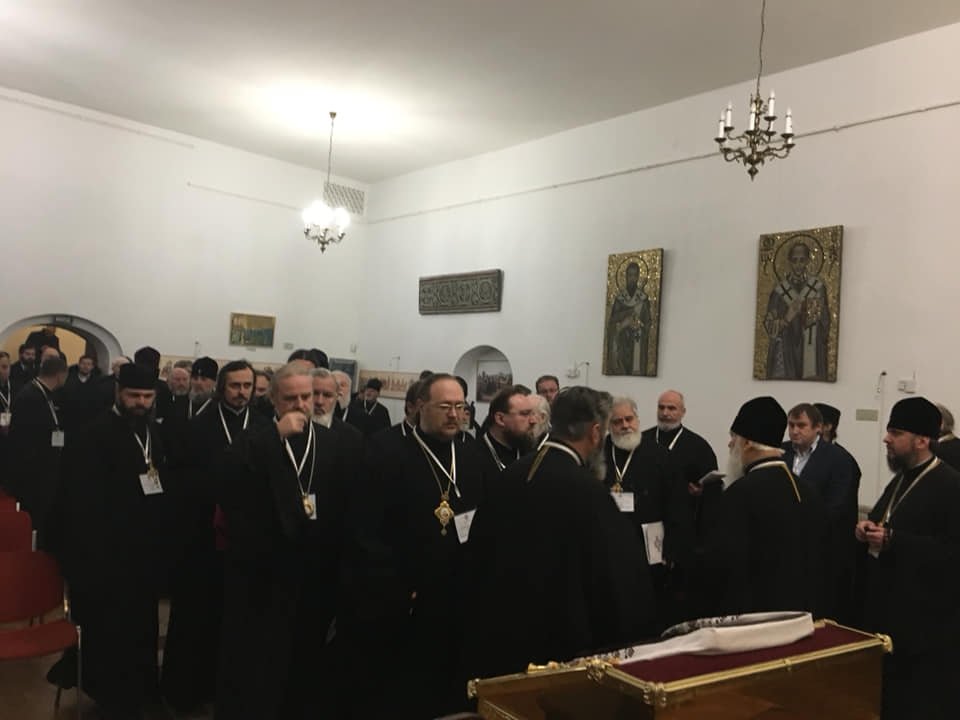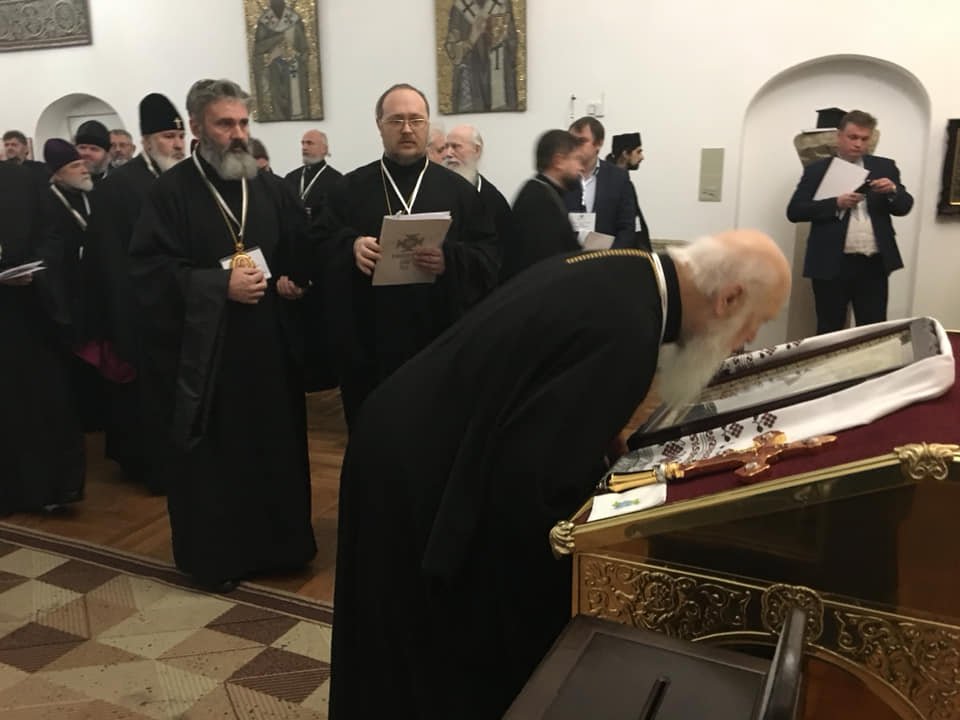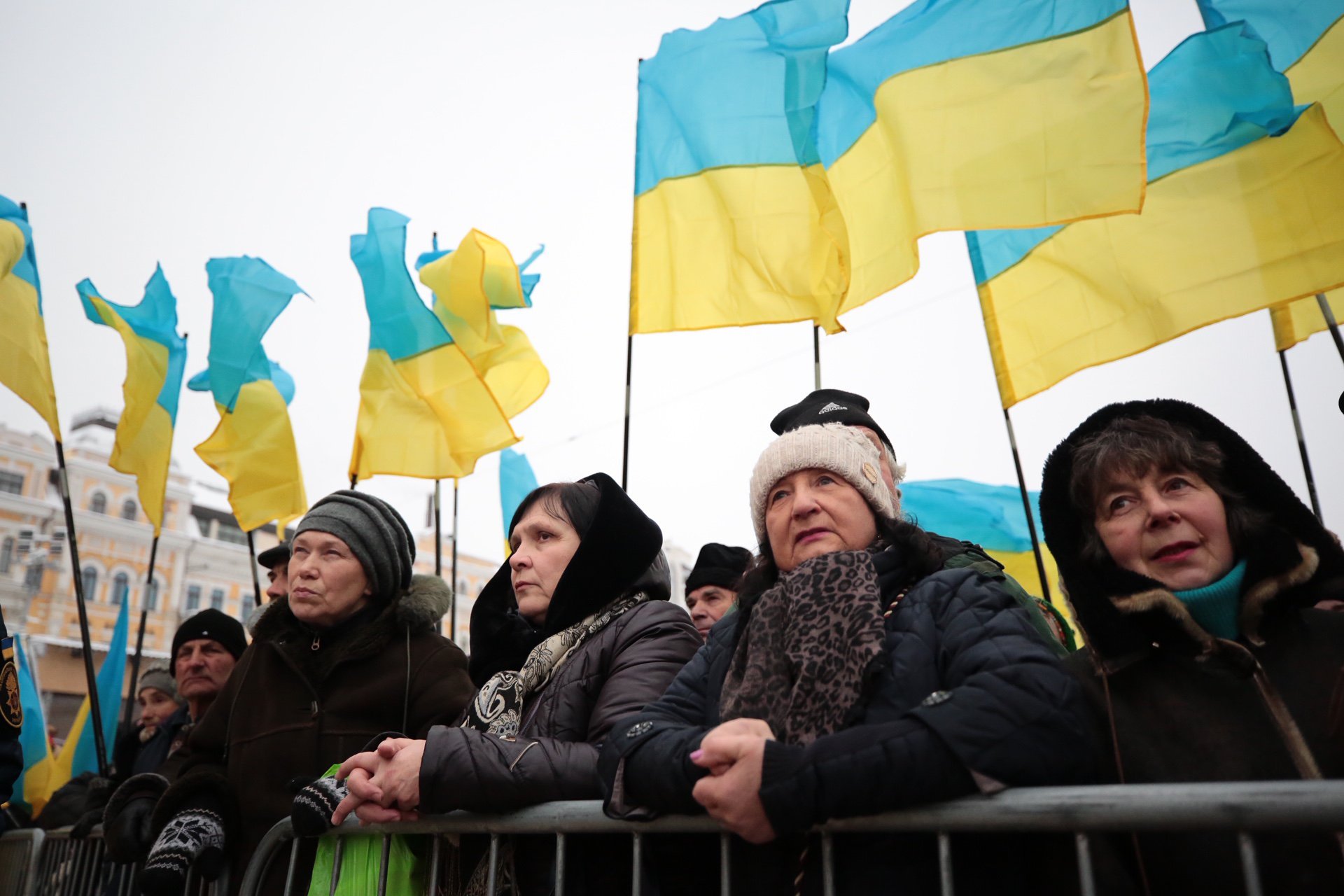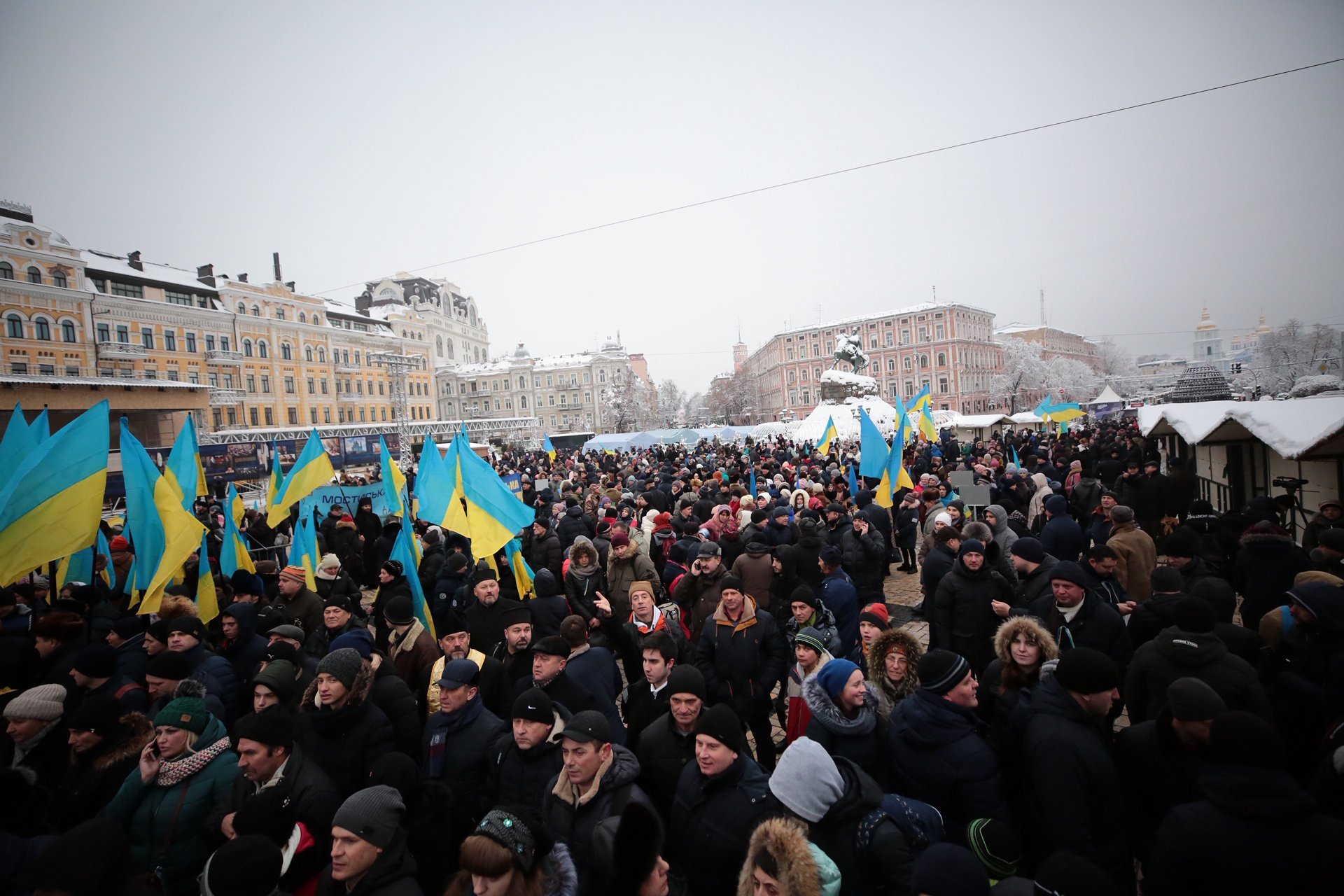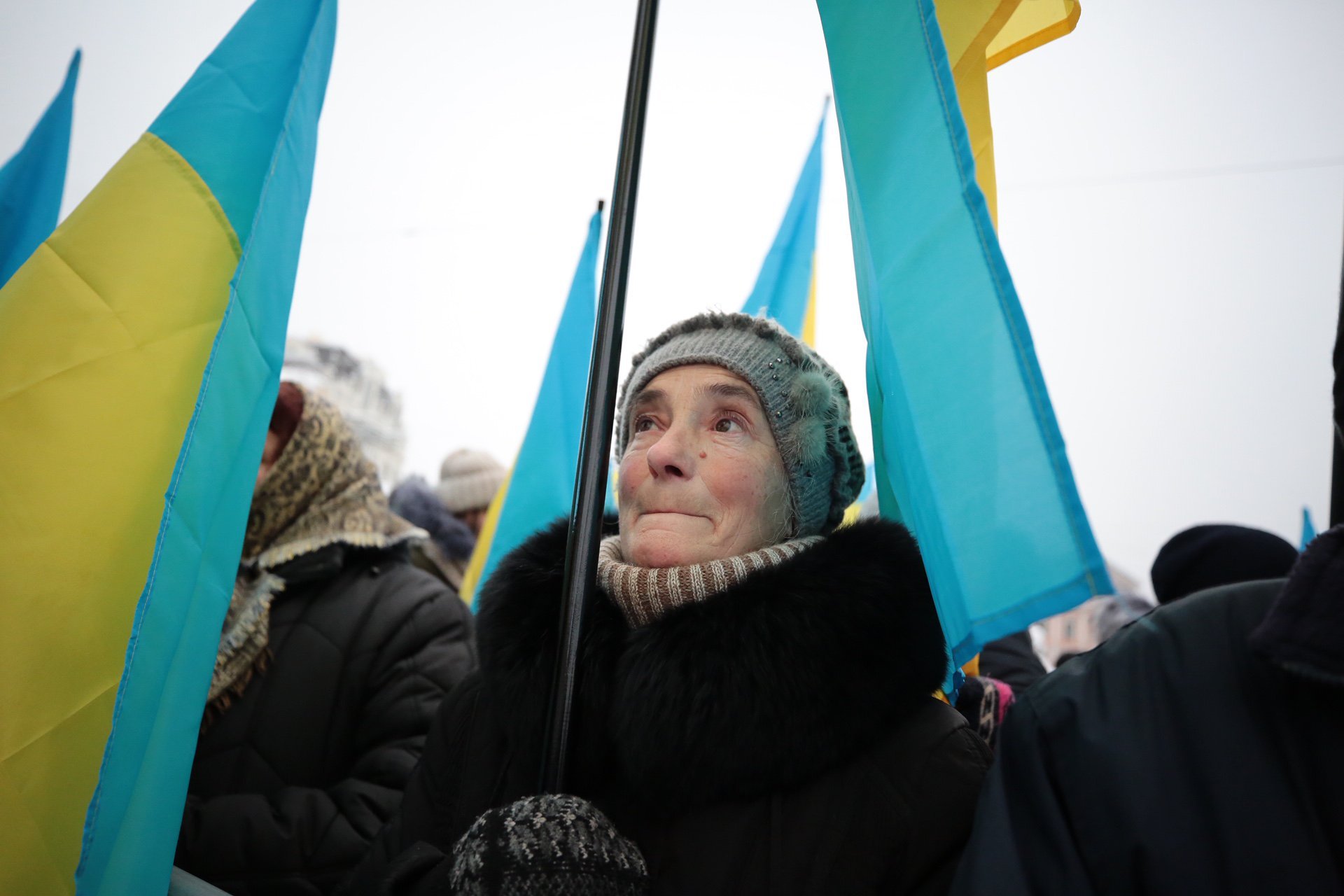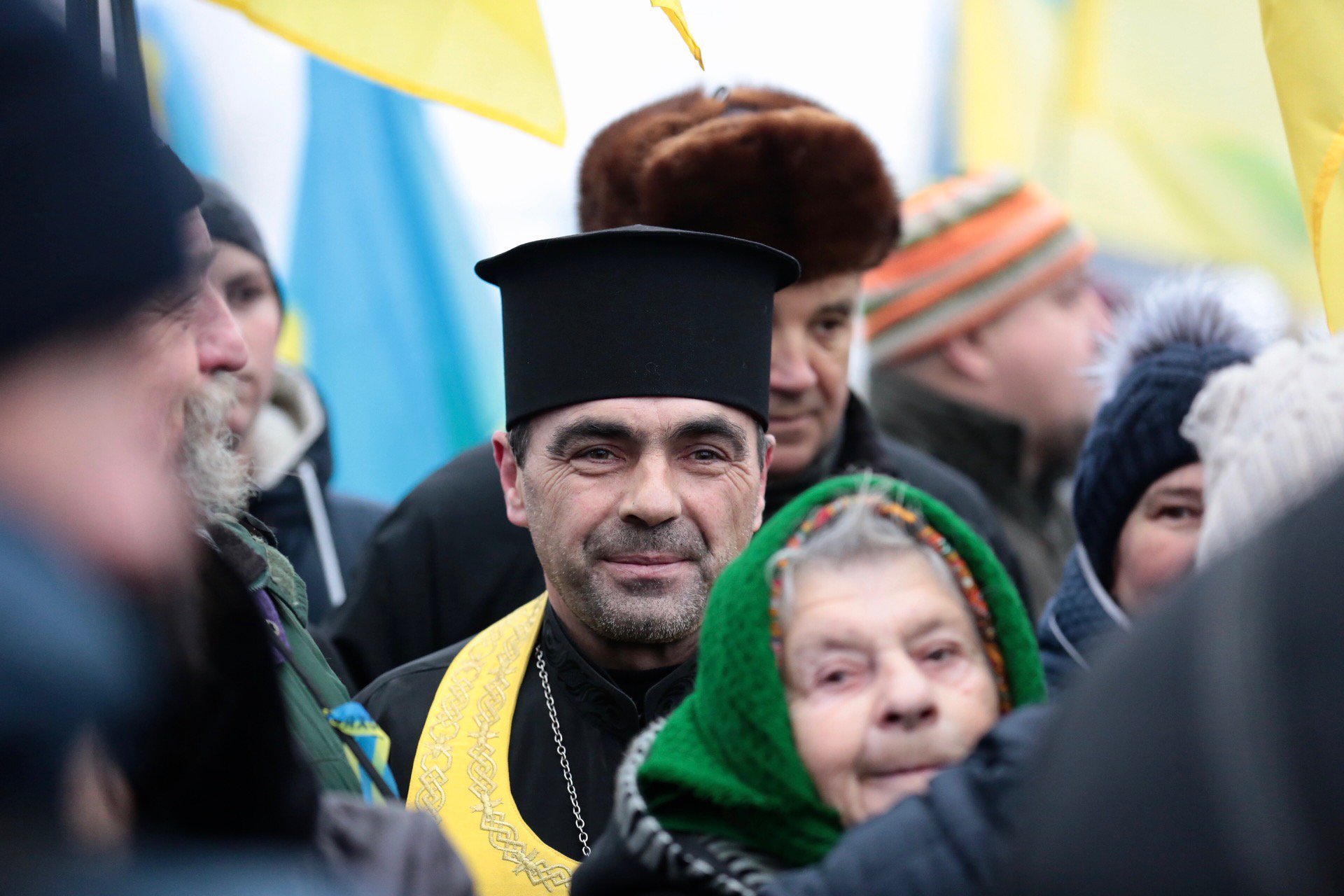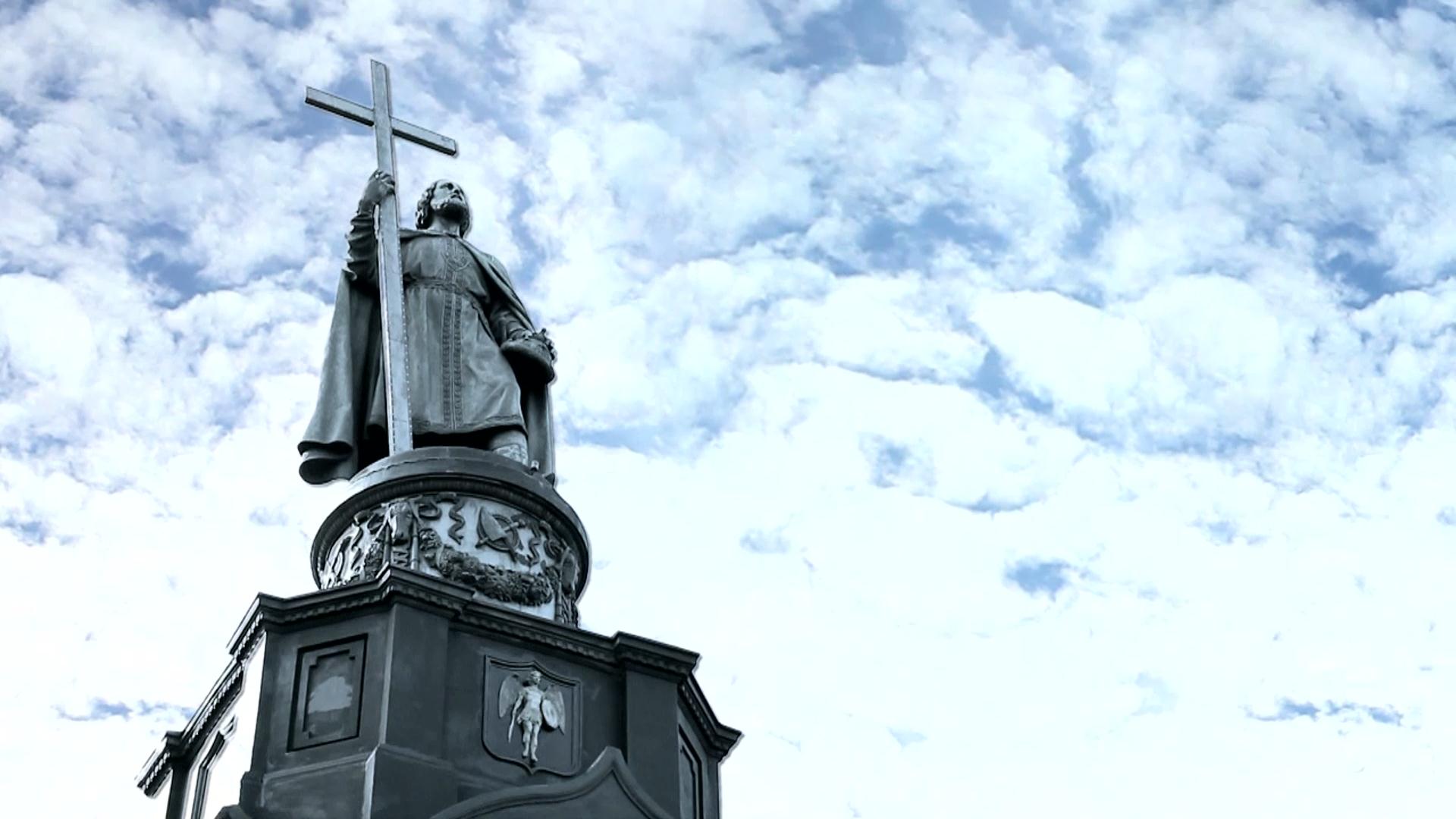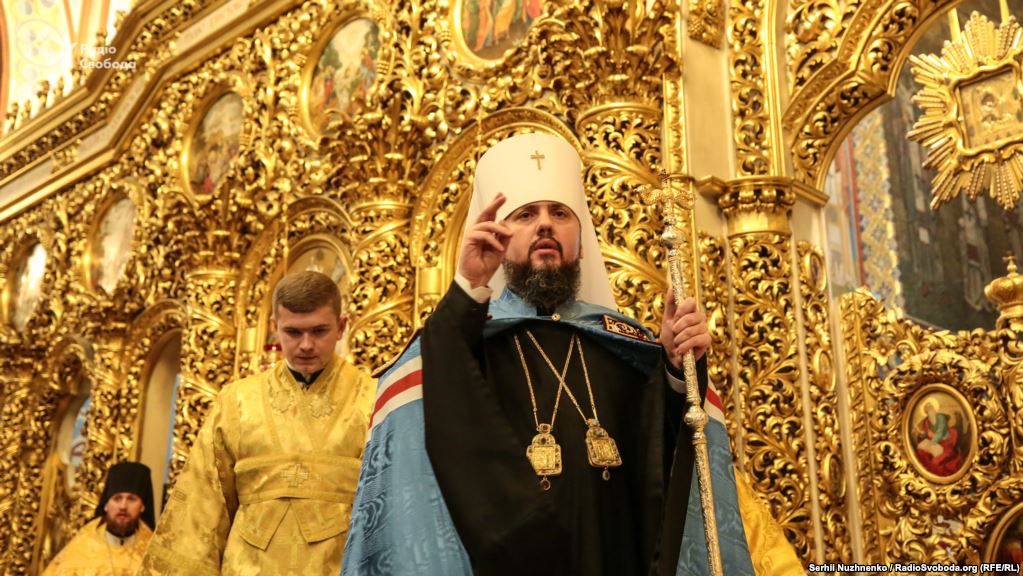On 15 December 2018, the Unification Council which brought together delegates from the three Orthodox churches in Ukraine to elect who will head the future unified independent Orthodox Church in Ukraine convened in the St. Sophia Cathedral in Kyiv. After two voting rounds, the delegates elected Epifaniy, metropolitan of Pereiaslav and Bila Tservka from the Ukrainian Orthodox Church of the Kyiv Patriarchate, as the Primate of the Church which is due to receive a Tomos, or declaration of independence, from the Patriarch of Constantinople, in the nearest month.
Euromaidan Press explains how it all happened and what this means for Ukraine and the Orthodox Church.
What happened?

The Ukrainian Orthodox Church, which was hitherto split between three branches, the Ukrainian Orthodox Church of the Moscow Patriarchate (UOC MP, subjugated to Russia), the Ukrainian Orthodox Church of the Kyiv Patriarchate and Ukrainian Autocephalous Orthodox Church (UOC KP and UAPC - until 11 October, schismatic Churches which were not in communion with the world Orthodox family), has made one step towards church independence.
This independence, or autocephaly, a cherished dream of many generations of Ukrainians, is closer to becoming a reality thanks to a number of factors: Russia's undeclared war against Ukraine, in which the UOC MP took a pro-Russian position, the campaign of Ukrainian President Poroshenko, and Ecumenical (Constantinople) Patriarch Bartholomew's willingness to take up the issue of Ukrainian autocephaly.
Read more in our explainer: Tomos ante portas: a short guide to Ukrainian church independence
On the morning of 15 December, Delegates from the three branches convened at a Unification Council in the Kyiv St. Sophia Cathedral, moderated by Metropolitan of France Emmanuil from the Ecumenical Patriarchate, to choose the leader of the new Church-to-be. After two rounds of voting, the delegates elected Epifaniy, metropolitan of Pereiaslav and Bila Tservka from the Ukrainian Orthodox Church of the Kyiv Patriarchate, to lead the future Unified Church.
Who is Epifaniy?

Epifaniy, who now carries the title of Metropolitan of Kyiv and all of Ukraine, was born on in 1979 in the Odesa Oblast. In 1996, he entered the Kyiv Theological Seminary from which he graduated in 1999; after that, he studied in the Kyiv Theological Academy.
He has a PHd in theological sciences, studied at the Philosophical Faculty of the National University of Athens and since 2007 was head of the philology department at the Kyiv Theological Academy. In 2007, he was tonsured a monk and named Epifaniy, following by his ordainment as a hierodeacon, hieromonk, and archimandrite. In 2008, he was appointed secretary of Patriarch Filaret, and then - chancellor of the Kyivan Patriarchate. He further climbed the career ladder in the UOC KP by serving as rector of the Kyiv Orthodox Theological Academy and a ruling bishop of the Pereiaslav-Khmelnytsky diocese. In 2012, Epifaniy was elevated to the rank of archbishop. and in 2013 - to the rank of Metropolitan of Pereiaslav and Bila Tserkva and was appointed patriarchal governor with the rights of the diocesan bishop.
Epifaniy is widely seen as Patriarch Filaret's protege. Patriarch Filaret, who split off the UOC KP from the UOC MP and headed it from 1992 until 15 December. Filaret himself had hinted that he sees himself as the Primate of the Church-to-be, although he was seen as a divisive figure by many in the three Orthodox Churches. Nevertheless, neither Filaret, nor the UAOC Patriarch Makariy put forward their candidatures for Primate. Patriarch Makariy said that he received a letter from the Ecumenical Patriarch dissuading him from the step; it can be assumed that the same letter was sent to Filaret.
That sounds like some kind of trouble. Did any conflicts predate the Council?
Oh yes. Well, apart from the UOC MP's position of boycotting the initiative and the Russian Orthodox Church severing eucharistic communion with Constantinople, conflicts arose when the UOC KP and UAOC, which supported Constantinople's initiative, started drafting the Statute, i.e. Constitution, of the United Orthodox Church-to-be. Public quarrels broke out, and Constantinople took charge of writing the Statute, which was approved on 29 November at a Synod, i.e. high church meeting, and sent it to Kyiv.
Until this day, the entire text of the Statute remains unclear and it is still being adjusted; nevertheless, some of the main positions met resistance in the UOC KP, as they conferred a slightly smaller degree of autonomy to the future church.
Filaret declared that UOC KP, as the largest Church in Ukraine, could reject Constantinople's proposals, stating that "we won't accept anything worse." As well, on 7 December, he announced that he will be a Patriarch "until his death" and will run for Primate.
Two of UOC KP's main demands, adopted on 6 December at a meeting of the Synod of the UOC KP, concerned the Council Procedure. While the Ecumenical Patriarchate envisioned holding the Council in the more democratic manner of giving the right to vote to bishops, priests, and laypeople and holding secret elections, UOC KP insisted that only bishops be given a voice and that the elections be held openly, with everyone seeing how the others voted.
Some observers interpreted this move as Filaret's attempt to solidify his power over the new church.
But an eruption of public criticism had prodded UOC KP to tame down the ambition and agree to the more democratic format of a Council, which is common for the Greek Church.
Who was present at the Council? Who were the other candidates?
Shots shared by the UOC KP press service show the inside process of the Council, which was closed to the public
The UOC KP and UAOC had joined Constantinople's unification process at the administrative level, so most of their bishops were present in St. Sophia on 15 December. But the UOC MP had boycotted the process as an entity. Metropolitan Onufriy, who heads the UOC MP, had struck a pose by sending back Bartholomew's invitation to participate in the Council.
Only 10 bishops of UOC MP out of 90 had signed the appeal of Ukrainian church leaders to the Ecumenical Patriarch on granting autocephaly. On the eve of the council, 10 UOC MP bishops confirmed their participation, but it is to this day unclear how many were actually present.
According to preliminary estimates, the total number of delegates was 192: 42 bishops of the UOC KP, 12 of the UAPC, and 10 of the UOC MP. Each came with a priest and layperson. Representatives of the Ecumenical Patriarchate - Metropolitan of France Emmanuil, exarchs Danylo and Illarion, and Metropolitan Amphilochius - had voted as well.
In the first round, all present, bishops, priests, and laity, had the right to vote.
Three candidates made it to the second round: two from the UOC KP - Epifaniy and his competitor, Metropolitan of Lutsk Mykhail, and one from the UOC MP - Metropolitan of Vinnytsia and Barsk Symeon. The votes for them were split evenly, but, as sources of Ukrainska Pravda told, after the intervention of Filaret, Mykhail withdrew his candidacy. Filaret's protege Epifaniy won with 37 votes; Symeon had 29.
So what changed now in the Church situation in Ukraine?
Thousands waited for the decision of the Council outside the St. Sophia Cathedral. Photos: RFE/RL
According to Archimandrite Cyril Hovorun, Ph.D., Senior Lecturer at Stockholm School of Theology, this is how the church situation changed in Ukraine over the last months.
Before 11 October 2018, when the Synod of the Ecumenical Patriarch lifted the anathemas on the leaders UOC KP and UAOC and reinstated its historic rights over the Kyiv Metropoly, most Orthodox Churches except the Russian one accepted the schismatic churches as members of the Church but did not recognize their administrative structures or their ordinations of priests and bishops. All 15 autocephalous Orthodox Churches recognized UOC MP members as members of the Orthodox Church, as well as UOC MP's administrative structure and ordinations. For the Russian Orthodox Church and some other Churches, it was an autonomous Metropoly of the Russian Orthodox Church. For Constantinople, the UOC MP were dioceses of the Russian Orthodox Church in Ukraine; however, the Metropolitan of Kyiv was always the Metropolitan, one of the diocese bishops of the Russian Orthodox Church.
From 11 October to 15 December 2018, the UOC KP and UAOC bishops and priests were recognized by most churches, but their administrative structures, including decisions adopted by their Synods, were not. Meanwhile, the members of the UOC MP and its ordained priests and bishops continued to be recognized, but Constantinople now considered the UOC MP Metropolitan in his position only as an act of goodwill. Strictly speaking, for the only legitimate administrative church structure in Ukraine is the Kyivan Metropoly as part of the Constantinople Patriarchate - the very same Metropoly which was created in the 10th century and given for Moscow to administer in 1686.
After 15 December: the Kyiv Metropoly of the Ecumenical Patriarchate, after two months of existence, will stop existing and will be replaced by the independent Ukrainian Church. The process of transformation from a dependent Metropoly to an independent Church will happen over 15 December 2018 - 6 January 2019, when Epifaniy will receive the Tomos of independence in Constantinople.
The UOC KP and UAOC no longer exist; they made a decision to dissolve their structures prior to the Council.
Constantinople will continue to recognize the UOC MP as the Orthodox Church and its bishops and priests as hierarchs and clerics of the Russian Orthodox Church in Ukraine. But the Kyiv Metropolitan Onufriy will lose his legitimacy, as there can be no two Metropolitans in one city.
If the UOC MP refuses to recognize Constantinople's decisions, they may face the church court in Constantinople and be sanctioned up to being stripped of their priesthood. First of all, this concerns those who defame and derogate the Ecumenical Church. In this case, they, like once UOC KP/UAOC representatives, will stop being viewed as acting Orthodox hierarchs.
Like in the case of UOC KP/UAOC, the Synod decisions of which Constantinople does not recognize after 11 October, any Synod or collegial decisions of the UOC MP lose their power for Constantinople after 15 December. Therefore, if any bishops will lose their dioceses or be stripped or priesthood for taking part in the Council of 15 December, these decisions will not have any powers for Constantinople.
What does President Poroshenko say? Was this all just part of his bid to get reelected?
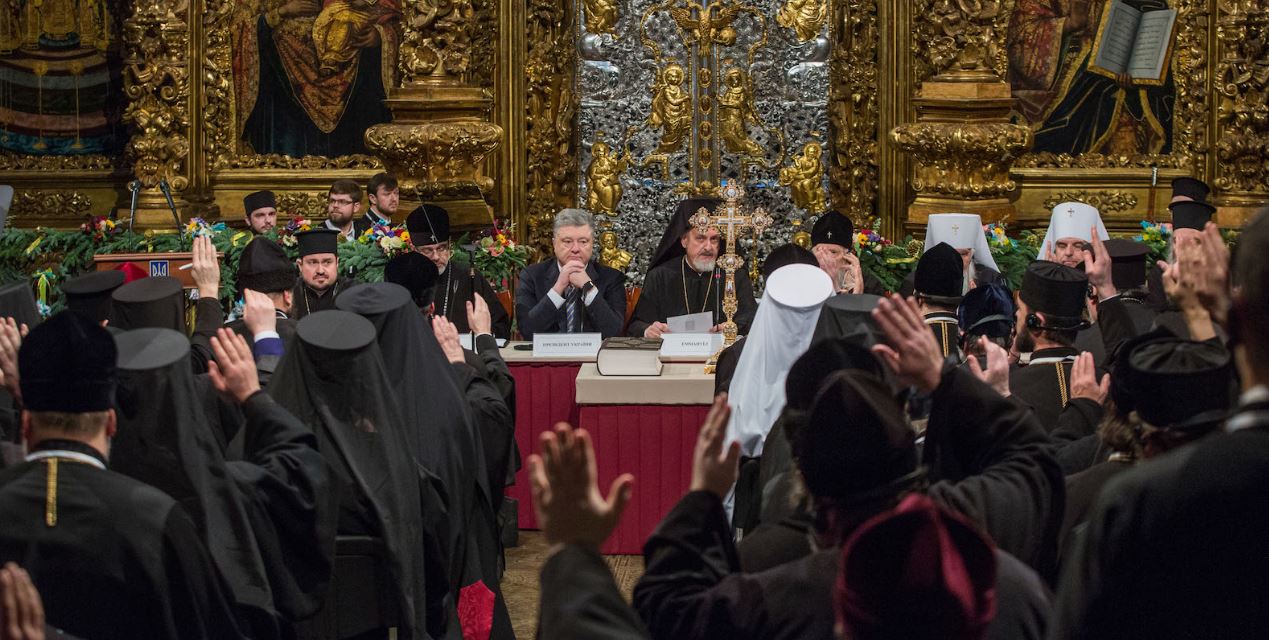
President Poroshenko made gaining church independence into his personal campaign. Some observers believe church independence is his only bid to get reelected in March 2019. However, Poroshenko's interest in Church autonomy for Ukraine, a dream of all previous presidents, started as early as 2015. Poroshenko, himself belonging to the UOC MP, had started being interested in church independence only when the UOC MP's pro-Russian position became a matter of national security for his country at war.
"Where a Russian thurible is waved today, a Russian Grad will shoot tomorrow," Poroshenko said outside the St. Sophia Cathedral, referring to how Russian propaganda chanelled by the UOC MP contributed to the war in eastern Ukraine.
In his letter to the Council Participants, Poroshenko stressed that church autocephaly is a historical event and a question of Ukrainian statehood:
"The issue of autocephaly is the issue of our Ukrainian national security. This is a question of our Ukrainian statehood. Finally, we have gained spiritual independence, which can be compared with gaining political independence. We are cutting off the chains that bind us to the empire. We are returning to our God-determined path and are going our own way now."
As well, he reiterated that Ukraine is a multi-confessional country and that nobody will be coerced to join the new church, assuaging fears that church property of the UOC MP will be seized.
Although, no doubt, Poroshenko has his own political motives for pursuing Church independence, and it could be argued that the political eclipsed the spiritual in his public speeches on 15 December, the timing of his activities to obtain it makes it unlikely that the upcoming Tomos is merely a pre-election activity.
What does the Moscow Patriarchy say?
Aleksandr Volkov, the press secretary of Moscow Patriarch Kirill, has stated that in the Russian Orthodox Church's eyes, the Council in Ukraine is an event where "schismatics chose a schismatic" that has "zero canonical value." He said that the Moscow Patriarchate will continue its development in Ukraine despite the creation of the new autocephalous Church. He also said that Epifaniy's recognition as a Primate in the Orthodox World is a "hardly achievable task."
Two days earlier, Kirill called on the United Nations, the leaders of Germany and France, the pope and other spiritual leaders to protect believers in Ukraine in the face of pressure on UOC MP clerics.
Meanwhile, the UOC MP has announced that its hierarchs who participated in the Council will not be sanctioned, as "they have no relation to us now." He claimed that they are now in a schism and that their positions will become vacant.
Altogether, despite hopes being high that the creation of a unified Orthodox Church in Ukraine will help heal its division between UOC MP, UOC KP, and UAOC, this has not happened. The UOC MP is here to stay, so far.
What does the Ecumenical Patriarch say?
The Ecumenical Patriarch has sent his greetings to the newly elected Primate and invited him to receive the Tomos on Theophany, i.e. Christmas, which according to the Julian calendar which the Ukrainian Orthodox Church lives by, is celebrated on 7 January.
What will happen next?
It's hard to say. According to Orthodox tradition, Ukraine's Church Autocephaly has to undergo reception by the other Orthodox Churches. Although the Ecumenical Patriarch carries symbolic primacy of being "first among equals," the Moscow Patriarch has significant influence over East European Churches. So far, most are undecided in whether to support the new Ukrainian Church.
Inside Ukraine, tensions around the UOC MP will probably continue, as the Church will attempt to show itself off as a persecuted entity.
However, separate UOC MP parishes may decide to join the United Church, "the doors of which are open to all," as Epifaniy said outside the St. Sophia Cathedral after being elected.
The Ukrainian state may continue to review the agreements to lease church buildings to the UOC MP, as it had recently happened with the Pochaiv Lavra, a major monastery in western Ukraine seen as a bastion of Russian imperialism.
Meanwhile, the United Orthodox Church will have a lot of work ahead to consolidate its structure and work on making its church life more meaningful in Ukraine, a task which was for nearly 20 years hampered by divisions and bickering.
Read also:
- Tomos ante portas: a short guide to Ukrainian church independence
- Constantinople decision on Ukrainian Church truly has global consequences
- Moscow Patriarchate’s Church in Ukraine will survive autocephaly, but as marginal force, Yurash says
- Why Ukraine needs a free and recognized Orthodox Church
- Draft tomos gives Ukrainian Church less autonomy than it hopes to obtain

